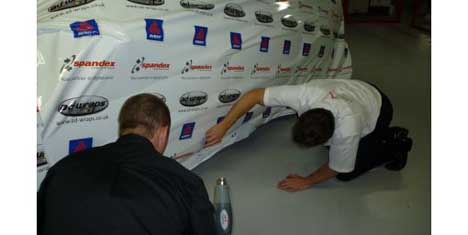
In this Business Insight feature - sponsored by EFI and written exclusively for Large Format Review - Rosemarie Monaco, CEO of Monaco International Ltd, an international marketing firm specialising in high technology and services, discusses how large format print businesses - small and large - can make savings whilst implementing green initiatives...
"On the 29th of October, 2012, Hurricane Sandy clobbered the New York Metro area. I was without electricity and heat for 11 days. But that was trivial in comparison to the damage others sustained. Hurricane Sandy was the most devastating storm in the history of New York City.
Living in New York, I used to wonder why anyone would live in areas of my country frequented by tornadoes, wild fires and flash floods. I was safe. Not anymore.
That got me thinking. Who out there can still deny the effects of global warming? Why aren’t we doing more to reverse its course?
I also thought about something else. As a member of the “Green Council” of a New York business association, I’ve seen businesses flourish after implementing green initiatives. Almost every company, many of them very small, that made a well thought-out change on behalf of the environment, not only recovered its initial investment in a short period, but almost immediately, began to save thousands a year by reducing waste and energy consumption.
So what are we waiting for? With the right plan we can support our businesses while helping the environment.
Steps to Saving Money on Behalf of the Environment
There are many “green” steps you can take that will lower your energy costs right away, such as replacing all your high-energy light bulbs with high-efficiency ones. But I will restrict my recommendations here to those that fall directly under the banner of large-format printing.
Workflow management. There are many ways to reduce waste, but the one that is most intrinsic to efficiency is workflow automation and enterprise resource planning (ERP). Don’t let the acronyms throw you. Your vendor will recommend the right solution for your company. But print management software will not only reduce paper and ink waste, it will also increase overall efficiency which can result in lower energy consumption.
Inkjet Ink. Beware of water-based inks. Some of these also contain co-solvents to compensate for water’s absorption issues. They also require extreme temperatures for the ink to bind to the media. Look for UV curable inks that are derived from renewable resources. These contain no VOCs (volatile organic compounds) or heavy metals. There are also some solvent inks that are made from renewable resources. While not as good as UV, if you do need to use solvent inks, these are an excellent alternative. So be sure to ask about ink composition when purchasing.
Energy Consumption. Large-format printers can be greedy energy eaters. Before purchasing a new system, compare energy requirements. Even with UV inks, some systems require high heat so the ink dries faster. You want the right combination of ink and curing technology so that you use less energy. LED technology uses the least amount of energy. Add to this cool curing and your energy provider will practically owe you money. And, using low heat also allows you to print on recycled substrates.
Media. Or substrates, or whatever you like to call that which you print upon. Ironically, with the newest inkjet technology you can print directly on just about anything. That saves mounting, which in turn, not only saves you money, but also saves large amounts of material and chemical adhesive waste. If the material you need for a specific project is not available in a recycled version, then go for those that are at least in part, biodegradable. Consider fabrics. In many cases textiles can be recycled or are made from natural fibers such as cotton.
Printer Components. Ask your vendor if the printer components are easily disposed of without high environmental impact.
Third-party Certification. While many vendors claim their systems are environmentally sound, certification from a credible third-party source will provide proof.
Maintenance. If a system requires a high-level of maintenance, that probably means an increase in waste and cleaning agents. Look for low-maintenance printers.
So even if going green is not high on your list of things to do in 2013, consider how an investment in green practices will benefit your bottom line. And remember that the devastation of severe climate change will likely find its way over the pond in the near future."
About Rosemarie Monaco: With 25 years experience in the graphic arts industry, Rosemarie Monaco is an expert in technology marketing. She is CEO of Monaco International Ltd, an international marketing firm specializing in high technology and services.










